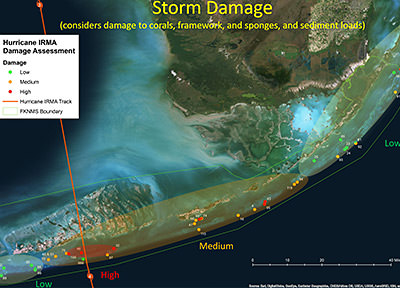In September 2017, the world saw one of the largest hurricanes ever recorded, decimate the Caribbean and slam full force into the East Coast of the United States. The damage was insurmountable and even today is still being cleaned up as these communities try to recover. One subset of communities drew our lab's particular interest... the coral reefs. Having studied the reefs for years, we had a wealth of data at our hands and the unique opportunity to study this storm damage first hand and compare it to what we know about these reefs already. When I started working in the lab for this CI, my project didn't really have a direction but this storm gave me the chance to focus on the recovery of these reefs as they start to rebuild. Pictured below is an initial assessment of reef damage put out by the Florida Keys National Marine Sanctuary.
As you can see, most of the damage is centered closer to the hurricane but it varied across all of the reefs. The worst damage was seen by algae, sponges, and soft corals as the hurricane picked up massive amounts of sand and blasted the reefs with it. Some hard corals were scoured as well as flipped over by the wave energy. The fish communities scattered as their homes were destroyed. These reefs are essential to this ecosystem, as is their recovery, so we plan to continue monitoring these reefs to see how they respond to a natural disaster of this magnitude.
One thing we have been able to do to help is spread awareness. Our lab had the honor of presenting three posters at the Clemson Biological Sciences Annual Student Symposium where we were awarded the best graduate talk and top 3 undergraduate poster. We were able to share our knowledge of these reefs and how important they are to our ecosystem with so many people and we hope to continue spreading awareness. Coral reefs are the rainforests of the sea in both their biodiversity but also in their endangerment. Simple things you can do to help include limiting your use of single use plastic, recycling, conserving energy, and encouraging others to do the same. The sea creatures will appreciate it.





No comments:
Post a Comment